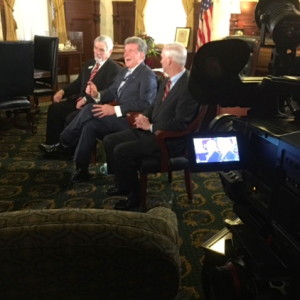Gov. Butch Otter doesn’t expect legislators to agree, to the penny, to his proposal to boost Idaho’s K-12 budget by more than $101 million.
But Otter also says the time is right to take a significant step to fund education.
“Have we reached a little bit? Probably,” Otter said in an interview Thursday morning. “(But) we needed to reach a little bit.”
Otter concedes that some lawmakers were taken aback by the magnitude of the proposed spending increase. But in an hour-long interview with Idaho Education News and KIVI and KNIN TV, he challenged lawmakers to seize the moment and endorse ideas that have widespread support in the education and business communities. “The economy’s turning around, a lot of folks seem to be on the same page.”

Thursday’s interview was Otter’s first extended interview since spelling out his education proposals in his State of the State address Monday. Otter was joined by two allies on K-12 issues: John Goedde, the former Senate Education Committee chairman who is now an adviser on education; and Rod Gramer, CEO of Idaho Business for Education, a nonprofit representing the state’s business leaders. Here are the key points from the wide-ranging interview:
Tiered licensure. Otter maintains that he would like to see the 2015 Legislature rewrite the teacher licensing system, shifting from an equation based on experience and education. He believes the plan may need to be adjusted over time — but the sooner the state adopts a framework and begins fine-tuning it, the better.
The Idaho Education Association opposes the tiered licensure plan, and Otter says he has heard from teachers who oppose it. He chalks up some of this opposition to uncertainty, and a tendency to “institutionalize” familiar practices and approaches.
Career ladder. Otter also wants to move forward this session on a five-year plan to boost teacher pay across the board. His budget calls for $31.9 million, a first installment in funding the $175 million rewrite.
This plan is also controversial, as the pay raises are tied to student growth and teacher evaluations. New state superintendent Sherri Ybarra would like to pilot the plan in three districts, rather than adopt it in 115 districts. Otter says he hasn’t discussed the idea with Ybarra, but worries that it might violate the state Constitution’s mandates for uniform education funding.
Operational funding. Otter calls for putting $20 million back into this line item in 2015-16, which would still leave districts $41 million shy of pre-recession levels. Ybarra and some district superintendents are pushing for more of an increase. That’s a “laudable goal,” Otter said Thursday, but the governor also said he tried to take a balanced approach to the education budget.
Idaho Education Network. A new state audit says use of the high school broadband system has decreased, but on Thursday Otter said the system is essential, especially in remote, rural districts. “The value of the IEN is no longer in question.”
Lawmakers will have to decide whether to spend $8.9 million to keep the system online through June 2016 — and replace federally administered money from “e-Rate” phone surcharges, funding that was cut off in 2013.
By July 1, 2016, the state hopes to rebid the contract, replacing a $60 million agreement that District Judge Patrick Owen declared void in November. Rebidding the contract should restore the state’s e-Rate funding, which once covered three-fourths of network costs. But Goedde said the state is pursuing a “bridge contract” that could restore e-Rate dollars in 2015. “We’re working very diligently down that road.”
Technology. Otter wants to put $11 million into classroom computers and teacher training, while allowing districts to decide where they need the money most. And he conceded that this was a conscious departure from Proposition 3, which would have furnished laptops to every high school student. Otter endorsed that idea, but voters overwhelmingly rejected it in November 2012.
Pre-kindergarten. Otter isn’t ruling out the idea of early education — a hot-button issue at the Statehouse — but he defended his “K-through-career” focus. If the state can successfully adopt changes to the K-12 system for a year or two, Otter said he might be willing to look at pre-K. “I don’t want us to take our eye off the ball,” he said. “I’ve got to deal with what we‘ve got, and right now, I’ve got K-through-career.”
Business leaders have been among the most prominent supporters of pre-K in Idaho. But taking some extra time should allow Idahoans to continue the discussion, and develop an “Idaho plan” for early education, Gramer said.
Last week, Education Week gave Idaho an “F” for early education.
Education vs. tax cuts. Otter wants to begin reducing corporate and high-end personal income tax rates — and, privately, he has heard support for the idea. But one prominent skeptic, Senate Local Government and Taxation Committee Chairman Jeff Siddoway, said he won’t entertain the idea unless teachers get a boost in pay.
Otter said he hopes Siddoway takes a “good hard look” at the career ladder proposal. And Otter isn’t sure whether the session will culminate in a showdown over education funding and taxes. “That remains to be seen.”
At this point, the debate over education spending, and larger budget issues, is just starting. Otter unveiled his plans Monday, and the Legislature is wrapping up the first week of its 2015 session. And for the next couple of weeks, Otter will be working from home. He will undergo hip surgery Tuesday, and will be out of the office for two to three weeks.
Coming next: In the Treasure Valley, watch KIVI and KNIN news Thursday and Friday for highlights from the interview. The KIVI-KNIN segments will also be posted at Idaho Education News.
